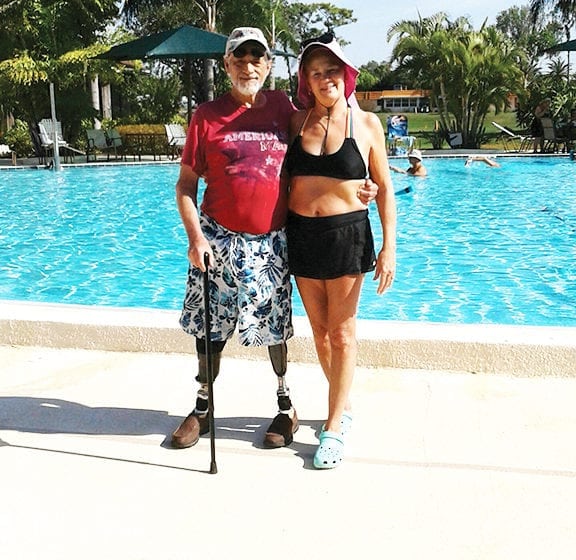By Elan Young
Vacation is a time to unwind and de-stress, but some amputees find the thought of traveling so uncomfortable and worrisome that they may miss out on opportunities to have fun on an adventure or a leisurely getaway. Traveling with limb loss requires a bit more care and planning, but as two well-seasoned amputee travelers attest, travel can be fun instead of stress-inducing. They offer some tips for making your vacation a success.
Jim Ramage, an above- and below-knee amputee since 1999, lives in Pittsburgh and is a regular traveler with his wife, Deb. Each year, they drive to Florida—partly for a checkup with his prosthetist, but also to enjoy staying in a beach condo. They also drive to most Amputee Coalition conferences and have driven to Colorado to visit family. They always make sure that hotels they stay in have accessible rooms, but they travel with a small bath chair in case a hotel is out of them or the one provided is too rickety, which has happened on more than one occasion.
Ramage notes that because he travels with his wife, many things are manageable that might otherwise create issues. “Most of the time, the hand-held shower is placed too high out of reach by housekeeping,” he says. “They also sometimes leave the TV remote in an unreachable place from a wheelchair.” Calling ahead can ensure that these problems are taken care of before arrival if an amputee is alone. Additionally, even though Ramage uses a cane for walking, when he takes off his prostheses, he uses a wheelchair. “We have had to explain to some friends that we’d love to visit them when invited, but most of the time, their home is not accessible,” he says. “If the guest bedroom is on the second floor and the doorway to the bathroom is too narrow for a wheelchair, then we just have to nicely say no.” He says that Deb reminds him that these invitations are a compliment to him because people don’t think of him as having a disability and needing a wheelchair.
Calling ahead to hotel and public pools helps the Ramages enjoy swim time. Even though the Americans with Disabilities Act requires public pools to be accessible, the couple has arrived to find that the wheelchair lift was not working or needed to be charged.
Lastly, the Ramages recommend looking into reimbursements for adaptive hand controls for driving. “As far as we know, most car manufacturers will reimburse up to $1,000 for any adaptive devices you need,” he says. “We have hand controls on our Lincoln Navigator and got them when we purchased the vehicle new in 2008.”
Debra Kerper, a travel agent with Easy Access Travel who has had a right below-knee amputation for 38 years, had her left leg amputated in early 2016. As an amputee who has also been a travel agent for people with disabilities for 25 years, she is well aware of the challenges of traveling but thinks that the rewards are more than worth the effort.
In her experience, some of the biggest challenges when traveling seem to be with the inconsistency of accessible accommodations in hotels. “The definition of accessible gets interpreted in way too many forms,” she says. “The installation of a grab bar does not mean accessible.”
As part of her work with clients, she tries to prepare for any pitfalls ahead of their trips, but all travelers with disabilities need to be flexible and prepared to deal with possible problems. “We do our best to avoid bad situations by using reputable tour guides who understand accessibility,” she says. “We try not to leave things to chance.”

Debra Kerper offers the following tips to anyone with an amputation who is considering traveling.
Be proactive and call ahead, ask for pictures, etc.
Know your disability rights.
When flying, check the airline website, read the section on accessibility, and make sure you understand it.
On domestic carriers, all medical equipment must be transported at no charge. If you have medical supplies such as catheters, bandages, prosthetic socks, liners, etc., you can put them in a separate suitcase labeled Medical Supplies, and the airline cannot charge for them. Be aware, however, that if you put anything else in the case, it no longer qualifies for the free medical supply exemption.
Travelers with disabilities never have to remove their shoes when going through security. Be proactive and identify yourself as a traveler with a disability.
Know your equipment. It is your responsibility to understand the best way to transport your power chair, scooter, or wheelchair. Ask the vendor for tips. Make sure the size of the aircraft will accommodate your equipment without taking it apart.
Use qualified travel agents who specialize in the needs of people with disabilities. They are worth their weight in gold.
Understand that the Transportation Security Administration is there to keep us all safe. Cooperate with them and explain your situation. It will make the process much easier.
Remember to purchase travel insurance. Accidents and emergencies do happen.
Editor’s Note: Be sure to verify this information before traveling. Travel-related policies may change at any time.



